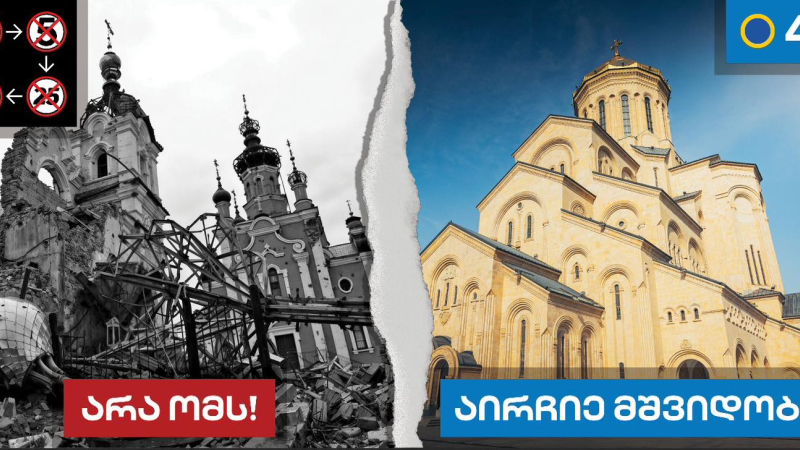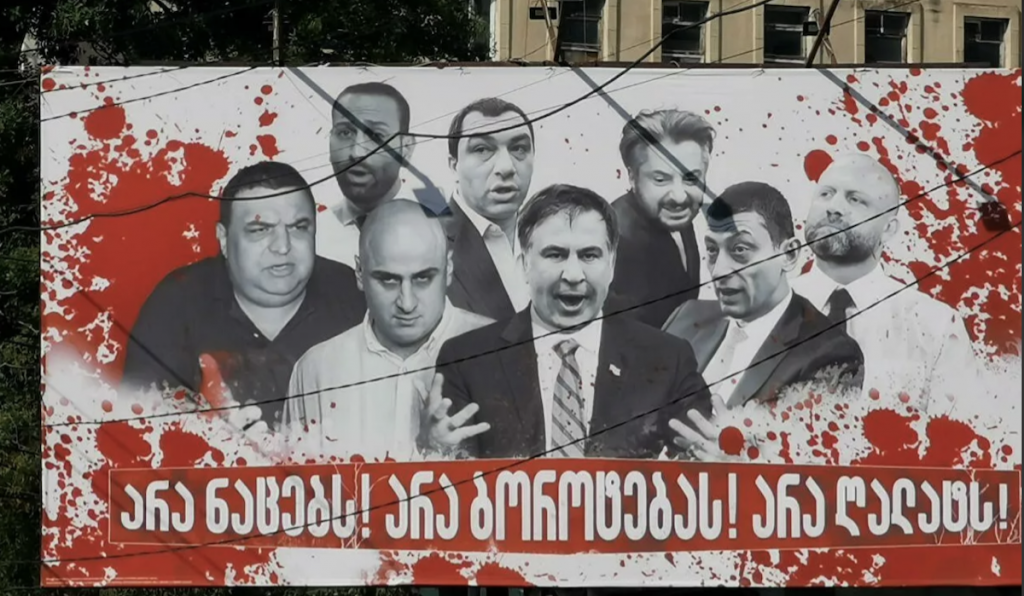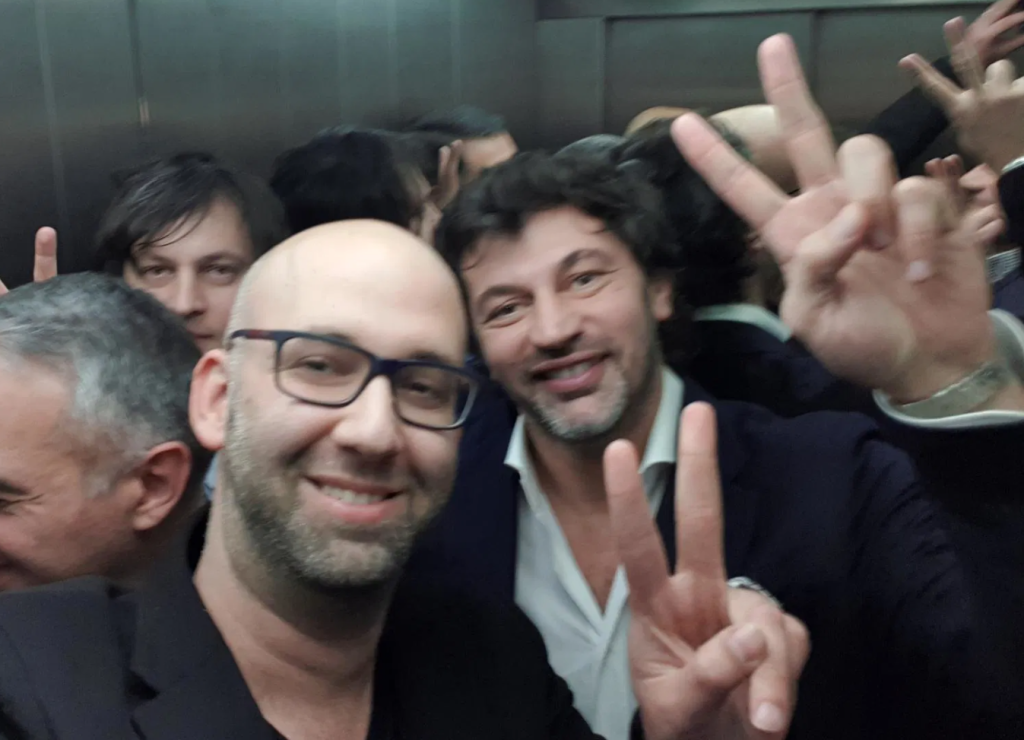
Georgian Dreams banners: reaction

On September 27, banners appeared on the streets of Tbilisi, with war-torn Ukraine depicted in black and white on the left, and peaceful, prosperous Georgia in full color on the right.
This is part of the election campaign of the ruling party, Georgian Dream. The party is once again reinforcing its main narrative: the peace in Georgia is solely due to the wise and prudent actions of Georgian Dream, while Ukraine, lacking such foresight, is now engulfed in war and destruction.
For example, one banner shows a bombed-out church in Bohorodychne, Donetsk region, on the left, and a vibrant image of Tbilisi’s Holy Trinity Cathedral on the right. Interestingly, the comparison was not made with an ancient Georgian church, but with a cathedral built just a few years ago by Bidzina Ivanishvili, the founder and honorary chairman of Georgian Dream.
Another example: on the left, a black-and-white photo of the destroyed Mariupol theater, and on the right, a color image of a theater in the Georgian town of Senaki, renovated with the support of Ivanishvili’s Cartu fund.
The banners don’t stop at just photos. In the top left corner, where the war-ravaged Ukraine is shown, the numbers 4, 5, 9, and 25—the ballot numbers of four major opposition coalitions—are crossed out. (4 is the Coalition for Change, 5 is the United National Movement, 9 is the Strong Georgia Coalition, 25 is For Georgia).
Alongside the banners, Georgian Dream released an election video with the same theme: the contrast between war-torn Ukraine and prosperous Georgia.
On the left side of the screen: black-and-white images of a destroyed school in Ukraine with the slogan “No to war,” and on the right: a beautiful new school in Georgia with the slogan “Choose peace.” Similarly, images on the left show destroyed overpasses in Ukraine, while on the right, new highways in Georgia, and so on.
Reaction to the banners
These banners and the accompanying video sparked a wave of outrage on social media. People called them shameful and described the campaign as “hitting rock bottom.”
President Salome Zourabichvili was one of the first to respond to the banners.
“I have never seen anything so disgraceful, so offensive to our culture, traditions, history, and faith… Where are you? What a pathetic act to present a poster created in the KGB’s forge to your people, showing such a lack of dignity and shame!” Zourabichvili wrote on Facebook.
“What could be more immoral than telling a country at war: your churches are destroyed, while mine are intact; your cities are in ruins, while mine are safe? In other words, you are telling a country under attack by an aggressive neighbor that it is to blame for everything that has happened to it, all in an attempt to gain electoral points.
These banners are a complete failure in terms of both propaganda and marketing. It is impossible for immorality to yield any positive results for anyone,” writes journalist Merab Metreveli.
“We need to print our own banners and hang them next to these ones. They should say: ‘Sorry, Ukrainians, for having such a corrupt, vile, and despicable government!’ We need to somehow wash away this shame!” suggests his colleague, journalist Ninia Kakabadze.
“I am speechless. How can one so cheaply exploit the fate, dignity, and future of a country devastated by an empire, using the dead for political purposes? How can we accept that the government of Georgia repeats the main mantra of Russian neo-imperialist policy: that the Ukrainians are to blame for the war, that they had a choice, and that they deserve what is happening on their land?
How dare you offend a people in distress without the slightest compassion?! Supporting ‘Georgian Dream’ is no longer a geopolitical, political, or ideological issue. It is a matter of humanity,” protests Tamta Mikheladze, director of the organization “Center for Social Justice.”
“It’s the same as placing photos of your own living children next to those of other people’s dead children. They are sick maniacs, and there’s no point in talking to them anymore. The answer will come on October 26… And those banners need to be taken down,” believes activist Giorgi Kikoniashvili.
Some found these banners reminiscent of Soviet propaganda.
One social media user suggested imagining how Georgia would react if Ukraine or any other country had created similar posters featuring scenes from the 2008 Russian-Georgian war in 2009 or 2010.
Additionally, many argue that these banners should not be shared on social media, as doing so inadvertently aids the propaganda of the “Georgian Dream.”
What is known about the banners?
The “Georgian Dream” party confirmed to Radio Liberty that these are indeed their election banners, produced at their request. According to “Georgian Dream,” they aimed to remind the public “where the opposition will lead the country.”
After 6 PM on September 26—i.e., as soon as the workday ended—employees of budget institutions, such as city halls and regional councils, began sharing and praising the banners and video on social media.
“This is indeed a good idea. Yes! There will be no war in Georgia, and we will protect it at all costs,” wrote Dachi Tsaguri, head of passenger transport services at the Georgian Railway.
“All moral and ethical boundaries have been crossed”
JAMnews asked political scientist Gia Khukhashvili, who knows the “Georgian Dream” party well from the inside, what could have compelled the ruling party to take such an extreme step.
“All moral and ethical boundaries have been crossed. This is an insult to the Ukrainian people!” says the political scientist.
The political calculations of “Georgian Dream,” according to Khukhashvili, are clear—he states that they see themselves as the leaders in everything:
In Khukhashvili’s view, the strategy of the “Georgian Dream” is to “instill fear and anxiety in society and position themselves as the only guarantee of peace.”
“They are trying to create the impression that if the government changes, the opposition will start a war the very next day.”
Khukhashvili recalls previous elections when “bloody” banners were also displayed in the streets.

Khukhashvili believes the current banners reflect the style of Israeli political consultant Moshe Klughaft, who collaborates with the “Georgian Dream” party.
“This was the aggressive style of Moshe Klughaft in previous elections. This idea, this proposal is his. In this case, I don’t know who exactly is the author of the banners, but this campaign is being conducted in the same spirit, with the same emphasis, carrying the same call to hatred. Such techniques are not used in the civilized world,” says the political scientist.
Who consults for the “Georgian Dream”?
In December 2023, the “Georgian Dream” party announced that it had hired Moshe Klughaft and his colleague Miri Michaeli as strategic advisors for the election period.
Klughaft positions himself as an international strategic advisor and leader of electoral campaigns for political leaders and parties, who, among other things, organized the second round of the presidential election campaign for Salome Zourabichvili in 2018.

On the official website of Moshe Klughaft, it is stated that Forbes magazine named him one of the most influential people in Israel under 40, and the Jerusalem Post recognized him as one of the 50 most influential Jews.
The same website mentions that Klughaft played a crucial role in the victory of the Romanian Social Democrats in the 2016 general elections and participated in elections in Austria, Germany, Italy, and Kosovo, working with high-ranking officials in Israel.
“I am glad to return to Georgia and see its significant development both in the economy and in its approach to the EU, and especially in its ability to maintain peace in these times when the world is at war. It is not enough to just do a lot — it is also important to ensure that the community knows about it, and we will help make that happen next year,” Klughaft stated in December 2023.
As for Miri Michaeli, according to Civil.ge, she is an investigative journalist from Israel with 17 years of experience in television. Her website indicates that Michaeli’s expertise includes lecturing on communication topics and organizing conferences, events, and ceremonies in Hebrew and English for organizations and companies worldwide.
JAMnews attempted to verify whether the “Georgian Dream” party is indeed working with these advisors, but the party’s press service did not respond to our calls and messages.
Reaction from the Ukrainian Ministry of Foreign Affairs
By the end of September 26, the Ukrainian Ministry of Foreign Affairs had responded to the controversial banners.
In an official statement, the ministry condemned the use of the horrifying consequences of Russia’s relentless war against Ukraine in political advertising, citing the suffering and blood of thousands of innocent people, as well as the destruction of sacred sites and humanity’s cultural heritage.
The ministry stated:
The Georgian people need not fear a new war as long as Ukraine resists Russian aggression. The terrible price of this resistance is also the price of peace in Georgia.
The Ukrainian side urged the Georgian government, the ruling party “Georgian Dream,” and all interested parties to refrain from using the topic of aggressive war against Ukraine and its citizens in Georgia’s domestic political struggle.
The Ministry also emphasized that Ukraine will continue to support the sovereignty and territorial integrity of Georgia within its internationally recognized borders.
We hope that the parliamentary elections in Georgia will be conducted peacefully and democratically, and that the people of the country will continue their strategic course towards joining the EU and NATO, the ministry concluded in its statement.
